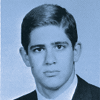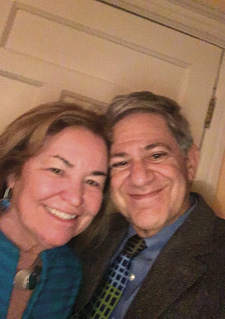David F. Tufaro – 50th Reunion Essay
David F. Tufaro
 216 Edgevale Road
216 Edgevale Road
Baltimore, Maryland 21210
dtufaro@terranovaventures.com
410-440-1103
Spouse(s): Sharon (1979)
Child(ren): Theresa (1980), Jennifer (1983), and Christina (1987)
Grandchild(ren): Elizabeth (2013) and Kathyn (2016)
Education: University of Pennsylvania, JD and Master of City Planning (1972)
National Service: Army Corps of Engineers (1969–1976 Reserves)
Career: Attorney at Piper & Marbury (1972–1978); 40 years as real estate developer (founder of Summit Properties (1984–1999), founder and principal of Terra Nova Ventures, LLC (1999–present)
Avocations: urban planning, active volunteer in various community-based organizations in Baltimore over my career; served on the Maryland State Board of Education (2004–2008); Republican candidate for mayor of Baltimore City in 1999
College: Silliman
My Yale education contributed to a lifetime of learning, exploring, and observing. Two professors in particular led me to scrutinize things said and written. Vincent Scully, through his lectures demonstrated the importance of observation, context, community responsibility, respect for the built environment, and the relationship between man and his environment. One of his assignments was to sketch New Haven from three perspectives: overlooking the Oak Street connector, looking at the I-95 exit dumping into Trumbull Street, and standing atop East Rock overlooking New Haven. Scully taught us to observe the urban form and how poor planning decisions negatively impact a city. I became a developer, and Scully’s insights influenced my design and development thinking. Roger Masters, professor of political theory, reminded us that it was important to read the prefaces to books, for there was often to be found the author or editor’s real intent.
Following graduation, I realized we had been snookered by being taught certain principles. First, Paul Samuelson’s Economics textbook promoted the multiplier effect concept—economic growth generated by federal government spending. Over the past 50 years, this notion has been used, in part, to justify an explosion in government spending and government intrusion into all facets of our lives, which has not been healthy, let alone constitutional.
A second issue in which we have been misled is the nature of our Constitution. I still own my pamphlet version of the Constitution I used in law school. Its preface belies a critical bias, that the Constitution is an organic document. As I have reread the Constitution over the years, it became apparent that view is far different from what the document is—an explicit contract with the citizens of the United States, detailing the role of the federal government and the states, the protection of individuals, and an explicit process to amend it. It is not to be modified by fiat handed from the president or administrative agencies, or by a ruling by nonelected judges. The organic view of the Constitution, in my view, has contributed to tribalism and divisiveness in this country by taking away power from the people in decision-making at the individual and local level. Centralized decision-making can only result in divisiveness unless it is supported by a nearly unanimous view of the people, which is rare.
Yale has morphed into an advocacy organization with a lot of baggage unrelated to encouraging independent research, unrestrained by political viewpoints or preconceived findings, and a healthy dose of skepticism. Yale has become totally predictable and scripted, hardly what one expects of a world-class university. It is known as a left-leaning institution. The very concept of a university of ideas is at odds with being known as liberal or conservative. The focus of Yale should be on the students to enable them to contribute to all forms of endeavor after graduation, including research, teaching, business, public service, and volunteerism.
This transformation of Yale following our graduation is both unanticipated and a disappointment.

Sharon and David

David

Grandchildren Kathryn and Elizabeth
If the above is blank, no 50th reunion essay was submitted.
